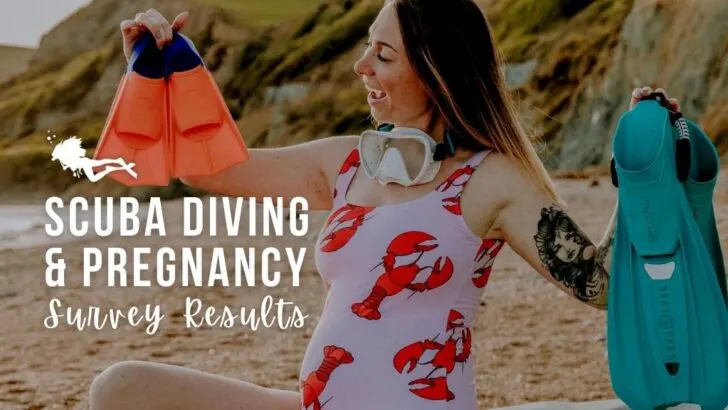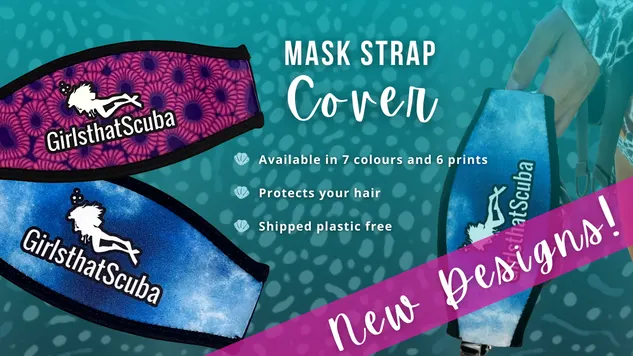As the world’s largest scuba diving community for women, Girls that Scuba are always looking to learn more about the issues which affect women in diving. Apart from knowing that it’s unsafe to dive whilst pregnant, the available information about scuba diving and pregnancy is quite limited.
We wanted to learn more about real peoples’ experiences of scuba diving and pregnancy. With a thriving community at our fingertips, it seemed that the best way was to ask them. So we ran a survey!
Read on to learn more about real life experiences of scuba diving and pregnancy, and how pregnancy and parenthood affects peoples’ diving activities.
Survey Results
There has been some limited scientific research into diving whilst pregnant, and medical research isn’t something we’re in a position to conduct. Although there is anecdotal evidence of dive professionals diving late into pregnancy with no negative impact on their babies, scuba diving during pregnancy is not recommended. You can read more about the safety of diving during pregnancy here.
The aim of this survey was to share experiences of how pregnancy and parenthood has affected scuba diving activities.
We received 147 responses, and here is a summary of some of the questions and answers.
Was it a hard decision for you to start a family with your scuba diving career/hobby in mind?
For many divers, being underwater is an incredibly large part of their lives. For others, it’s their source of income as dive professionals. Making a decision to start a family knowing they’ll have to take at least 10 months out of the water can be a challenge.
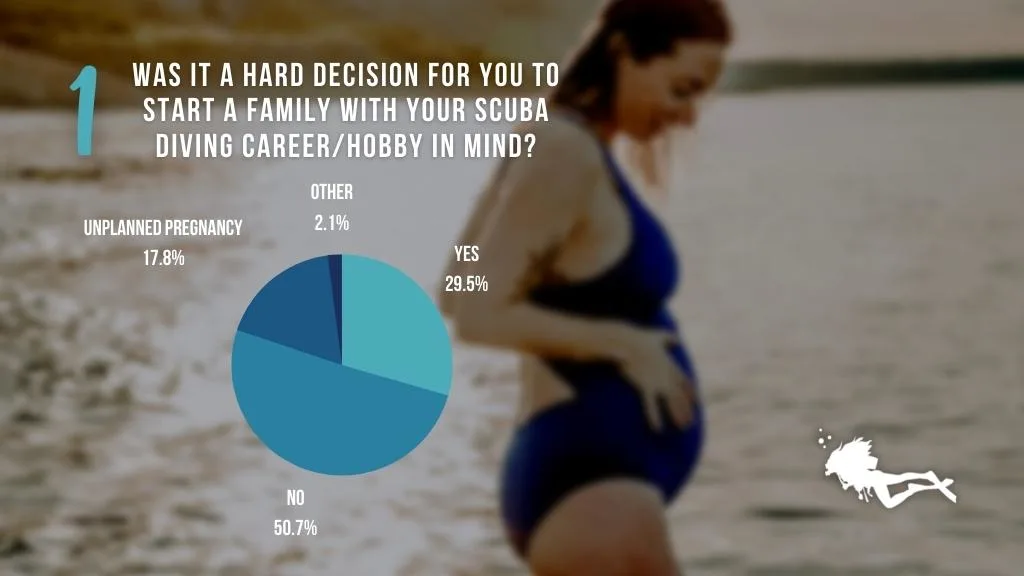
A slight majority of 50.7% said that no, it wasn’t a hard decision to start a family considering their scuba diving activities. However, almost a third of respondents, 29.5%, said that yes this decision was difficult.
The “Other” responses included respondents commenting that 9 months is only a short time to give up diving.
Did you have a scuba trip/day planned that you had to cancel once you found out you were pregnant?
With travel often being a big part of diving activities, most divers have a scuba trip booked to look forward to. After finding out they were pregnant, 41.8% of divers surveyed had a dive trip planned which they had to cancel as a result.
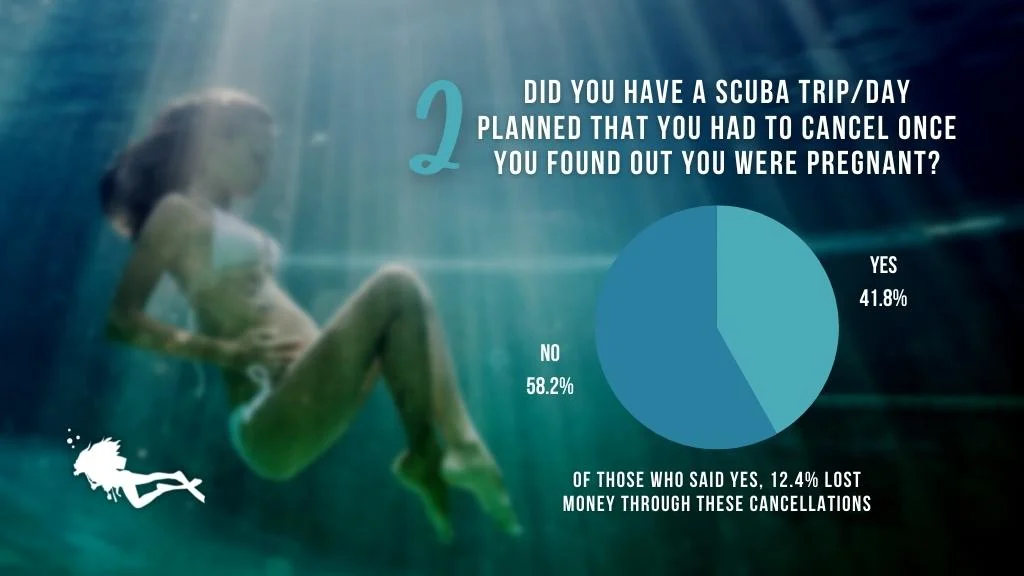
Of those who had to cancel, 12.4% of these divers lost money as a result.
Could you find suitable in-depth information online about why you couldn’t scuba dive while pregnant?
As we’ve discussed, there are limitations on the information available to divers about pregnancy in diving. We wanted to know if divers felt like they could find suitable, in-depth information explaining why it’s not safe.
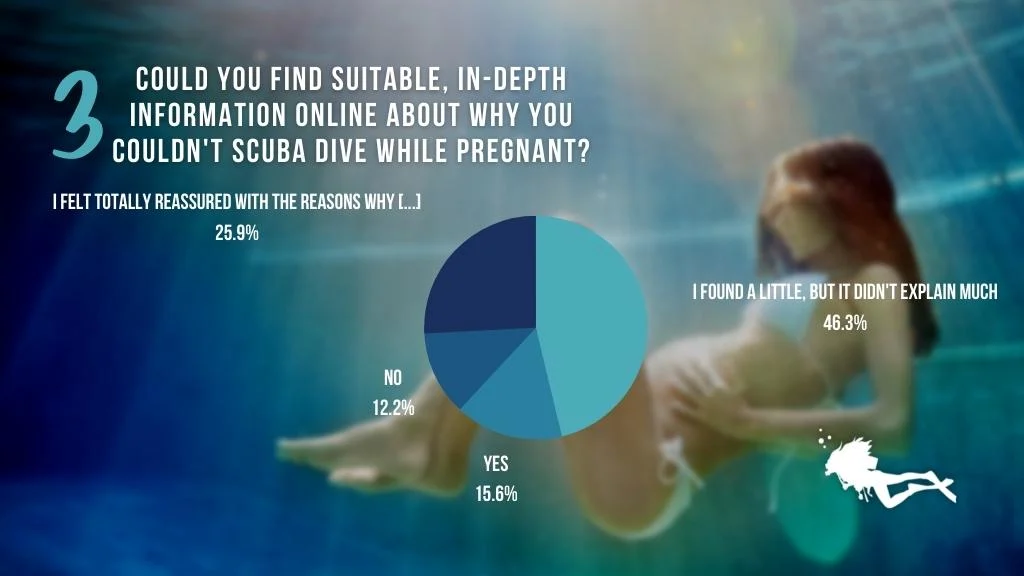
The majority, 46.3%, responded that they “found a little, but it didn’t explain much”. 25.9% were reassured with the reasons why they couldn’t dive, and 15.6% said that they did find suitable, in-depth information. 12.2% said that no, they couldn’t find suitable, in-depth information about why they couldn’t dive.
These responses suggest that there is more to be done within the dive industry to explain the in-depth reasoning why diving in pregnancy isn’t safe.
Did you scuba dive while pregnant without knowing you were pregnant?
With many people not knowing they’re pregnant during the early stages, they may continue normal planned activities, including diving, without realising they’re carrying. We wanted to know how many people scuba dived during pregnancy without knowing they were expecting.
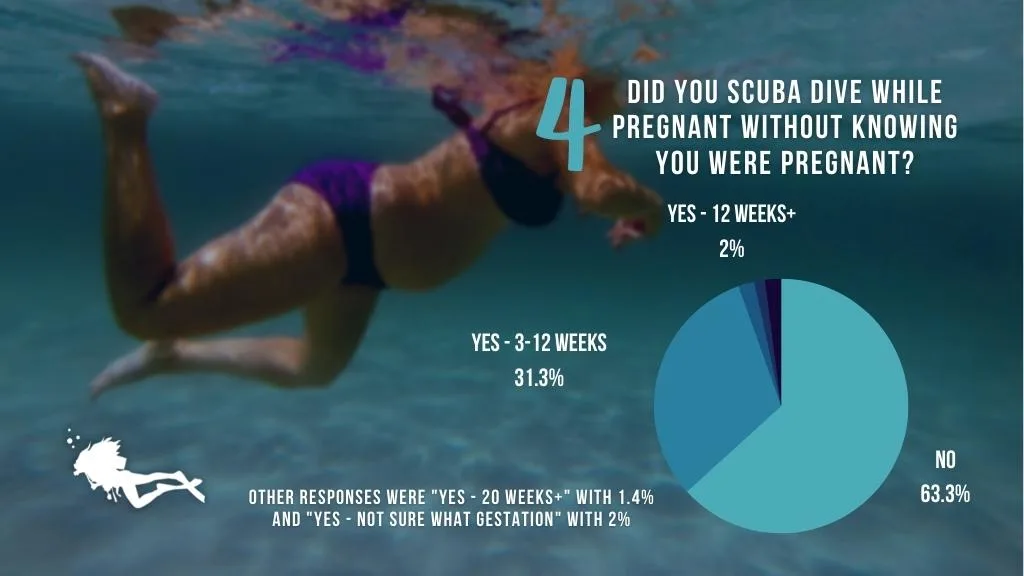
The majority at 63.3% did not dive while pregnant without knowing they were pregnant. The second highest response was those who dived whilst 3-12 weeks pregnant, at 31.3%. The remaining responses were “Yes – 12 weeks+” with 2%, “Yes – 20 weeks+” with 1.4%, and “Yes – Not sure what gestation” with 2%.
When was your first scuba dive after birth?
Apart from medical guidance (a minimum of roughly 4-6 weeks after birth for a doctor’s approval), there are a multitude of reasons why people may not immediately return to diving after giving birth. We’ll come onto those next, but first we wanted to know how long people waited before diving after birth.
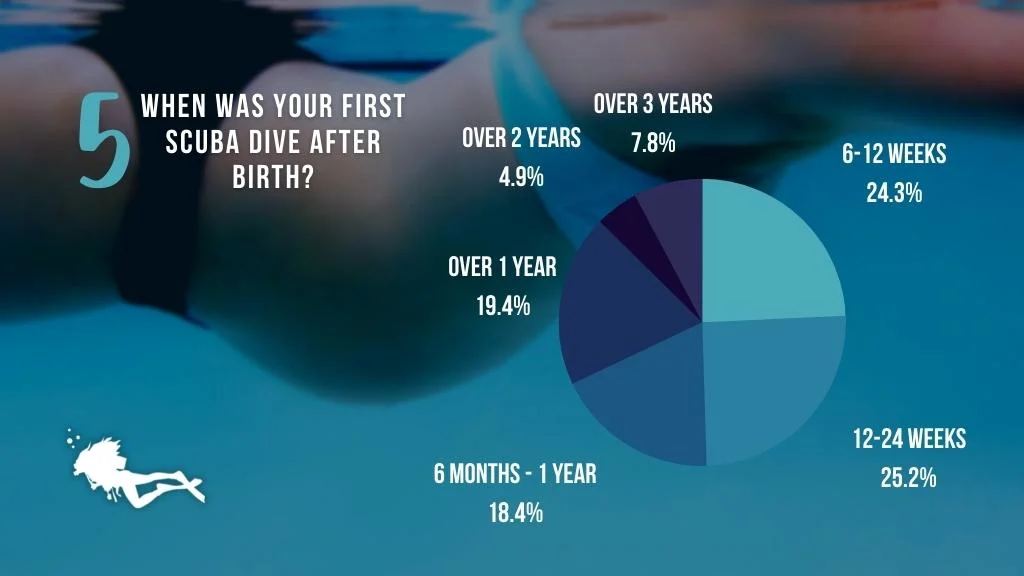
25.2% of respondents returned to diving within 12-24 weeks. Slightly less divers returned to diving between 6-12 weeks, at 24.3%. 19.4% returned to diving over a year later, and slightly less within 6 months-1 year at 18.4%.
The remaining respondents returned to diving after over 2 years (4.9%) and over 3 years (7.8%).
What was your biggest hurdle in getting back into diving after birth?
We wanted to try and understand what hurdles people were facing in getting back into the water after giving birth. These categories can’t cover every experience, but respondents also had the opportunity to write longer form replies about changes in their dive experiences after childbirth.
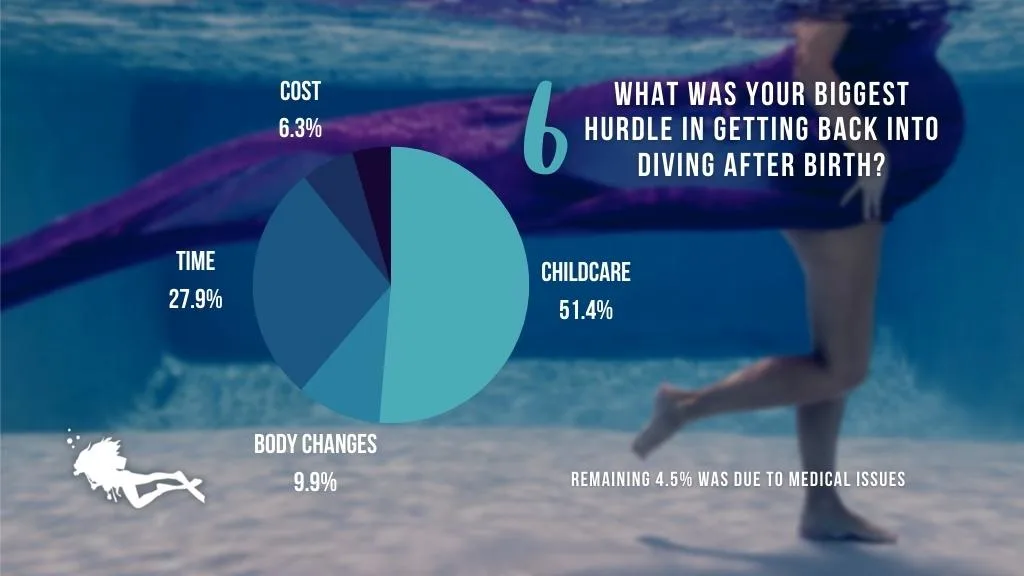
The large majority said that childcare was the biggest hurdle, affecting 51.4% of respondents. The next largest response was time, at 27.9%. Body changes were the biggest hurdle for 9.9% of respondents, with 6.3% of divers being affected by cost after having children. The remaining 4.5% was due to medical issues.
Changes in Scuba Diving After Birth
We gave respondents the option to answer a long form reply to the question “Did you experience any changes in scuba diving after birth? For example, you couldn’t switch off while diving worrying about your baby. Your body has changed. You don’t feel as comfortable as before etc”
99 people responded, with only 13 responding that no, they didn’t experience any changes in their diving after giving birth.
The changes experienced were incredibly varied. Lots of them included concerns about the baby’s wellbeing, and experiencing guilt at leaving their baby to go diving. There were also many comments which referred to being more cautious about diving and being more risk-averse, including technical divers only completing recreational dives following birth.
“…it’s an unnecessary risk I’m not willing to take whilst my child is dependent on me. No matter how well trained, competent, conservative and fit to dive I may be. Deep tech diving in inherently higher risk, and my own desire to do that does not outweigh my child’s need to have a living mother”
There were also many comments about body size, and not fitting into pre-pregnancy exposure suits. Another repeated comment was the challenges of breastfeeding and scuba diving.
“As a nursing mother who did not take the 6 week baby with me on scuba trip. There was little to no info on the effects of diving on breast milk. So I pumped and tossed. And was not told how painful diving would be on those breasts. I had contacted DAN and spoke to many professionals and no one had any advice or answers”
Other Considerations
The final question gave respondents an open box to reply to “Anything else you’d like to add about your experience with diving while pregnant?”
Here are some of their responses:
“I think the sheep studies should be more widely publicized, because that would have made me less bummed about my decision to get out of the water in the first place. I would also like to see any notes on diving while nursing. I waited for a long time to get back in the water because I was afraid the compression would mess with supply, or that having full breasts would cause extra squeeze and hurt, but I couldn’t find any info.”
“I found some info about pregnancy and scuba diving online, but very little about whether or not it’s OK to do short and shallow (max 5 metres) free dives when I snorkel during my pregnancy. I have stayed above or on the surface due to the lack of information on this topic.”
“Would be great that dive resorts cater more for diving parents! On site nanny / childcare services, easy one dive boat trip vs. whole day boat trip, accommodating meal times etc. Both my husband and I are avid divers (and dive buddies) and now its almost impossible to go on a dive vacation due to child care”
“It’s difficult but so worth it for my children, I keep reminding myself that I have been diving over 15 years and can keep diving for many years but I only have a short amount of time to enjoy pregnancy and my babies. In the meantime I can snorkel and share my love of the ocean with my kids so hopefully they will want to dive with me someday”
What Changes Can the Dive Industry Make?
Whilst it’s impossible to change the fact that diving during pregnancy is unsafe, there are a number of things which can be done to create better experiences for pregnant people before and after childbirth.
The ethical challenges around medical research apply during pregnancy, but there is a significant lack of medical research around the effects of diving on people who are breastfeeding. More guidance needs to be available for people who want to breastfeed and scuba dive.
Many respondents want to see a change in the availability of childcare at dive resorts. Dive operators are missing a portion of the market by making it challenging for people with children to join a dive day. Whilst it’s not possible for every dive operator to have child care on site, it could be a simple task to look for child care in the area to be able to recommend to guests.
If you’re looking to learn more about diving after pregnancy, follow Girls that Scuba founder Sarah as she navigates returning to diving having recently welcomed her first baby! We also have our Mums that Scuba sub-group, to support members through all things related to motherhood and diving.
Share this article with someone who needs to learn more about pregnancy and diving!

